<< Previous | Displaying results 11-20 of 92 for "Jehovah's Witnesses" | Next >>
Aart Bouter, a Jehovah's Witness, was arrested by the Dutch police and deported to Sachsenhausen concentration camp. The Netherlands, 1946–47.
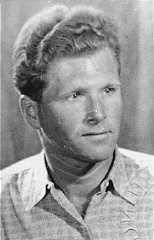
A group of Jehovah's Witnesses in their camp uniforms after liberation. These men were imprisoned in the Niederhagen bei Wewelsburg concentration camp. Niederhagen bei Wewelsbug, Germany, 1945.
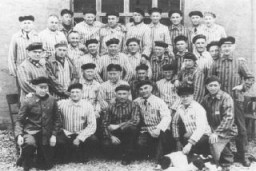
Karl-Heinz Kusserow, a Jehovah's witness who was imprisoned by the Nazis because of his beliefs. He was a prisoner in the Dachau and Sachsenhausen concentration camps in Germany.
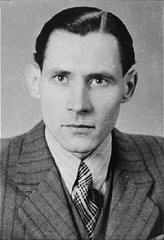
Robert and his family were Jehovah's Witnesses. The Nazis regarded Jehovah's Witnesses as enemies of the state for their refusal to take an oath of loyalty to Adolf Hitler, or to serve in the German army. Robert's family continued its religious activities despite Nazi persecution. Shortly before Robert's birth, his mother was imprisoned briefly for distributing religious materials. Robert's hip was injured during delivery, leaving him with a disability. When Robert was five years, he was ordered to report…

Musician Erich Frost was a devout Jehovah's Witness active in the religious resistance to Hitler's authority. Frost was caught smuggling pamphlets from Switzerland to Germany and was deported to the Sachsenhausen concentration camp near Berlin. There, he composed this song in 1942. Frost survived the war and died in 1987. This translation is taken from the Jehovah's Witness Songbook. Simone Arnold Liebster, who sings the English version of the song, was born in 1930 in Mulhouse, French Alsace. After the…
Ruth lived in Uzliekniai, a village in the Memelland, a region in southwestern Lithuania ruled by Germany until 1919. An avid reader, Ruth was distressed by news of postwar political turmoil. In 1923, when Uzliekniai became part of Lithuania, she joined the Jehovah's Witnesses. She married Eduard Warter, another Jehovah's Witness, in 1928. They had four children over the next five years. 1933-39: Ruth was busy raising her children and making sure they did their Bible studies. On March 22, 1939, the German…
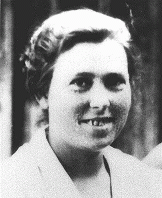
Helene lived in Herne and Bochum in western Germany, where she was married to a coal miner who was unemployed between 1927 and 1938. Following their disillusionment with the Lutheran Church during World War I, Helene, who was a nurse, and her husband became Jehovah's Witnesses in 1926. Together, they raised their two children according to the teachings of the Scripture. 1933-39: Under the Nazis, Jehovah's Witnesses were persecuted for their missionary work and because they believed their sole allegiance…
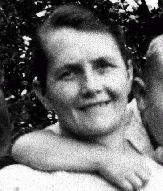
Franz and his family were Jehovah's Witnesses. Germany annexed Austria in 1938. After World War II began, Franz's father was executed because, as a Witness, he opposed war. In 1940, Franz refused to participate in military training and would not salute the Nazi flag. He was imprisoned, interrogated by the Gestapo (German Secret State Police) in Graz, and sentenced to five years of hard labor in a camp in Germany. Franz was liberated by US forces in 1945.
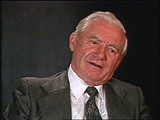
We would like to thank Crown Family Philanthropies, Abe and Ida Cooper Foundation, the Claims Conference, EVZ, and BMF for supporting the ongoing work to create content and resources for the Holocaust Encyclopedia. View the list of donor acknowledgement.